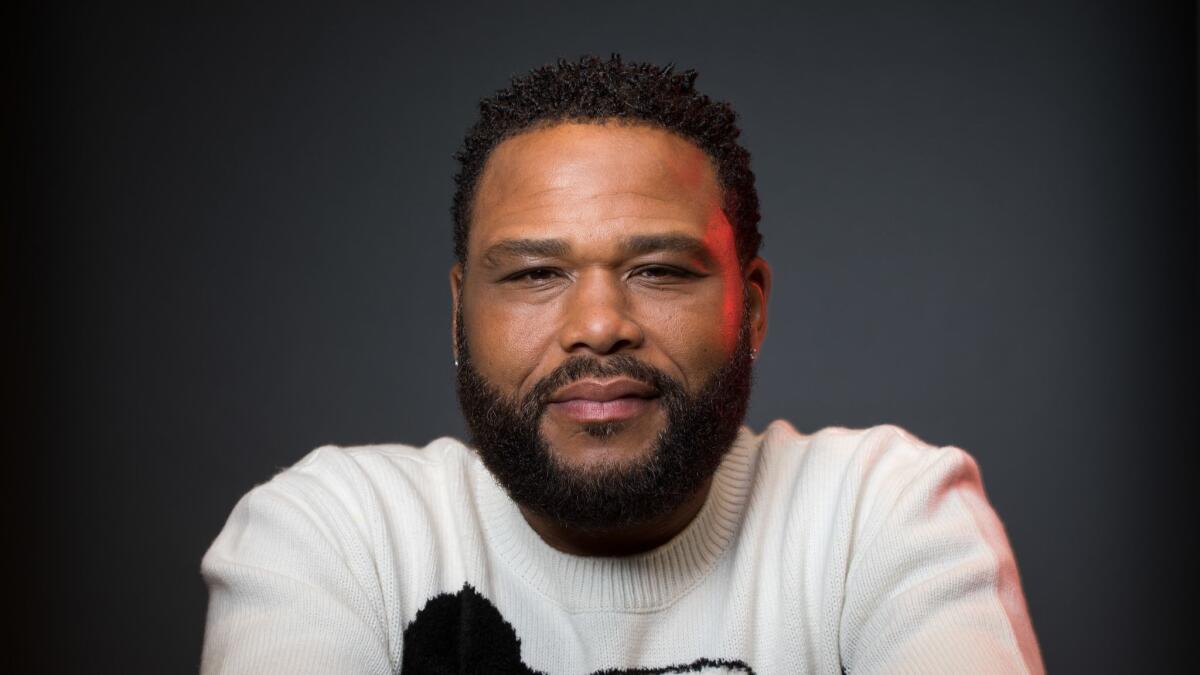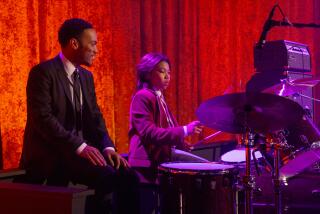Q&A: Everyone has issues, but Anthony Anderson and ‘Black-ish’ put them on TV
Reporting from New York — For six seasons, Anthony Anderson’s “black-ish” has been both hilarious and fearless in its tackling of major societal issues. That’s helped Anderson earn four Emmy nominations for his portrayal of dad Dre (a character inspired by show creator Kenya Barris) and landed him a slew of other projects – including ABC’s recent “Live in Front of a Studio Audience: Norman Lear’s All in the Family and The Jeffersons,” a revisiting of two classic sitcoms that were also simultaneously funny and pointed. The Envelope chatted with Anderson over lunch in New York City to talk about opening a dialogue, what inspired him -- and, well, issues.
“Black-ish” is on the surface a traditional network family sitcom, but it also deals with serious problems and features flights of fantasy. How important is that shifting tone to its enduring appeal?
I think our appeal is the authenticity in which we tell these stories. We don’t try to pander to one audience or demographic. We’re willing to buck the system and be in your face about things that a lot of people only think about – but we say and do. Kenya and I looked at shows like “The Jeffersons,” “All in the Family,” “Good Times,” “The Cosby Show.” These shows said something, meant something and had a point of view. You knew Archie Bunker was a bigot. There was never any second-guessing about, “What is this guy really about?”
Do you think that people who thought the way Archie Bunker did saw themselves in him — and learned a lesson? Or did he just validate them?
You’re going to get that in every aspect in life. People are going to embrace it and say, “Yeah, that’s me, I’m being noticed.” Then you’re going to get other people to be like, “Now, what can we do about that? How can we change this?” The thing I love about our show is that the subject matter and topics create conversation and bring people to the table. We start the conversation. Who knows where you can go once that dialogue happens?
Are there issues you’d like to address on “black-ish” that you haven’t gotten around to yet?
Me, personally, not at the moment. It’s not like when I was doing “Law & Order” and we’d snatch things from the headlines. What happens with “black-ish” issues happened organically. I leave that creative process to Kenya and our team. I don’t want to tackle anything right now.
How did you know you were a funny guy originally? Was there a single moment?
There were only three things I ever wanted to be: I wanted to play for the Dallas Cowboys. I wanted to be a lawyer and eventually a judge; and also an actor. At age 9, I realized if I became an actor, I could be all three of those things.

What happened at age 9?
My mother was onstage at Compton Community College, rehearsing for “A Raisin in the Sun.” And I happened to look up onstage, and there’s my mother rehearsing – that particular moment is when I realized that’s what I wanted to do with my life… . This is my calling; this is what I was put on this earth to do. I consider that a gift. If you’ve been blessed with the gift, it’s your responsibility to share.
Circling back to the notion of dealing with big subjects in TV sitcoms: There’s been a lot of discussions in the last year in the industry, from #OscarsSoWhite to #MeToo. Have those discussions changed the business significantly?
The industry is forever evolving, and these issues will always be in the forefront as we continue to grow because as we continue to grow, and if we continue to grow the right way, we’re giving opportunities to everyone. Yeah, I think it’s been a significant change. Is more change needed? Yes. There’s always a need to be heard and to be seen.
Have you found your own personal opinions about these issues evolving in the last year?
Yes, but you champion something that’s near and dear to you that affects you. I will deal with what affects me personally. First and foremost, I have to deal with that. And once I have that base and I’ve dealt with me, I can go out and deal with everybody else’s stuff.
More to Read
From the Oscars to the Emmys.
Get the Envelope newsletter for exclusive awards season coverage, behind-the-scenes stories from the Envelope podcast and columnist Glenn Whipp’s must-read analysis.
You may occasionally receive promotional content from the Los Angeles Times.










